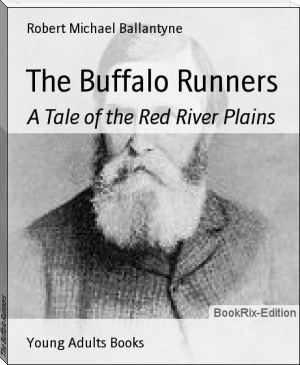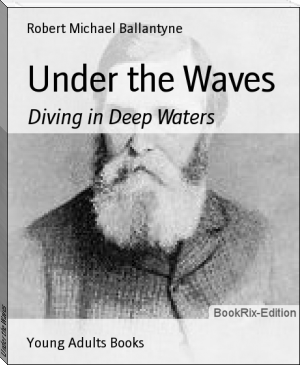The Buffalo Runners - Robert Michael Ballantyne (read aloud .txt) 📗

- Author: Robert Michael Ballantyne
Book online «The Buffalo Runners - Robert Michael Ballantyne (read aloud .txt) 📗». Author Robert Michael Ballantyne
All that day they pushed on almost without halt, and spent the next night in a clump of willows; but Dan was too anxious to take much rest. They rose at the first sign of daybreak, and pushed on at their utmost speed, until the poor dogs began to show signs of breaking down; but an extra hour of rest, and a full allowance of food kept them up to the mark, while calm weather and clear skies served to cheer them on their way.
CHAPTER FOUR.
TELLS OF LOVE, DUTY, STARVATION, AND MURDER.
Pushing on ahead of them, with that sometimes fatal facility peculiar to writers and readers, we will now visit the couple whom Dan and his party were so anxious to rescue.
A single glance at Elspie McKay would have been sufficient to account to most people for the desperate anxiety of Daniel Davidson to rescue her from death, for her pretty sparkling face and ever-varying expression were irresistibly suggestive of a soul full of sympathy and tender regard for the feelings of others.
Nut-brown hair, dark eyes, brilliant teeth, and many more charms that it would take too much time and room to record still further accounted for the desperate determination with which Dan had wooed and won her.
But to see this creature at her best, you had to see her doing the dutiful to her old father. If ever there was a peevish, cross-grained, crabbed, unreasonable old sinner in this world, that sinner was Duncan McKay, senior. He was a widower. Perhaps that accounted to some extent for his condition. That he should have a younger son--also named Duncan--a cross ne'er-do-weel like himself--was natural, but how he came to have such a sweet daughter as Elspie, and such a good elder son as Fergus, are mysteries which we do not attempt to unravel or explain. Perhaps these two took after their departed mother. We know not, for we never met her. Certain it is that they did not in the least resemble their undeparted father--except in looks, for McKay senior had been a handsome man, though at the time we introduce him his good looks, like his temper, had nearly fled, and he was considerably shrivelled up by age, hard work, and exposure. The poor man was too old to emigrate to a wilderness home when he had set out for the Red River Colony, and the unusual sufferings, disappointments, and hardships to which the first settlers were exposed had told heavily on even younger men than he.
Elspie's love for her father was intense; her pity for him in his misfortunes was very tender; and, now that he was brought face to face with, perhaps, the greatest danger that had ever befallen him, her anxiety to relieve and comfort him was very touching. She seemed quite to forget herself, and the fact that she might perish on the bleak plains along with her father did not seem even to occur to her.
"It wass madness to come here, _whatever_," said the poor old man, as he cowered over the small fire, which his son Fergus had kindled before leaving, and which Elspie had kept up with infinite labour and difficulty ever since.
The remark was made testily to himself, for Elspie had gone into the surrounding bush, axe in hand, to find, if possible, and cut down some more small pieces of firewood. When she returned with an armful of dry sticks, he repeated the sentiment still more testily, and added--"If it wass not for Tuncan, I would have been at home this night in my warm bed, wi' a goot supper inside o' me, instead o' freezin' an' starvin' oot here on the plain among the snow. It's mischief that boy wass always after from the tay he wass born."
"But you know that poor Duncan could not guess we were to have such awful weather, or that the buffalo would be so scarce. Come now, dear daddy," said the cheery girl, as she heaped on wood and made a blaze that revived the old man, "I'll warm up some more of the tea. There's a very little left--and--and--it surely won't be long till God sends Daniel and Fergus back to us with food."
Old McKay was somewhat mollified by her manner, or by the fire, or by the prospect of relief held out, for his tone improved decidedly.
"Try the bag again, lass," he said, "maybe you'll find a crumb or two in the corners yet. It will do no harm to try."
Obediently poor Elspie tried, but shook her head as she did so.
"There's nothing there, daddy. I turned it inside out last time."
"Wow! but it's ill to bear!" exclaimed old Duncan, with a half-suppressed groan.
Meanwhile his daughter put the tin kettle on the fire and prepared their last cup of tea. When it was ready she looked up with a peculiar expression on her face, as she drew something from her pocket.
"Look here, daddy," she said, holding up a bit of pemmican about the size of a hen's egg.
The old man snatched it from her, and, biting off a piece, began to chew with a sort of wolfish voracity.
"I reserved it till now," said the girl, "for I knew that this being the second night, you would find it impossible to get to sleep at all without something in you, however small. If you manage to sleep on this and the cup of hot tea, you'll maybe rest well till morning--and then--"
"God forgive me!" exclaimed the old man, suddenly pausing, as he was about to thrust the last morsel into his mouth; "hunger makes me selfish. I wass forgettin' that you are starvin' too, my tear. Open your mouth."
"No, father, I don't want it. I really don't feel hungry."
"Elspie, my shild," said old Duncan, in a tone of stern remonstrance, "when wass it that you began to tell lies?"
"I'm telling the truth, daddy. I did feel hungry yesterday, but that has passed away, and to-day I feel only a little faint."
"Open your mouth, I'm tellin' you," repeated old Duncan in a tone of command which long experience had taught Elspie promptly to obey. She received the morsel, ate it with much relish, and wished earnestly for more.
"Now, you'll lie down and go to sleep," she said, after her father had washed down the last morsel of food with the last cup of hot tea, "and I'll gather a few more sticks to keep the fire going till morning. I think it is not so cold as it was, and the wind is quite gone. They have been away five days now, or more. I think that God, in His mercy, will send us relief in the morning."
"You are a goot lass, my tear," said the old man, allowing himself to be made as comfortable as it was in his daughter's power to accomplish; "what you say is ferry true. The weather feels warmer, and the wind is down. Perhaps they will find us in the mornin'. Goot-night, my tear."
It was one of the characteristics of this testy old man, that he believed it quite possible for a human being to get on quite well enough in this world without any distinct recognition of his Maker.
Once, in conversation with his youngest son and namesake Duncan junior, he had somehow got upon this subject, not by any means in a reverential, but in an argumentative, controversial spirit, and had expressed the opinion that as man knew nothing whatever about God, and had no means of finding out anything about Him, there was no need to trouble one's head about Him at all.
"I just go about my work, Tuncan," he said, "an' leave preachin' an' prayin' an' psalm-singin' to them that likes it. There's Elspie, now. She believes in God, an' likes goin' to churches an' meetin's, an' that seems to make her happy. Ferry goot--I don't pelieve in these things, an' I think I'm as happy as hersel'."
"Humph!" grunted the son in a tone of unconcealed contempt; "if ye _are_ as happy as hersel', faither, yer looks give the lie to your condeetion, _whatever_. An' there's this great dufference between you an' her, that she's not only happy hersel', but she does her best to mak other folk happy--but you, wi' your girnin' an' snappin', are always doin' the best ye can to mak everybody aboot ye meeserable."
"Tuncan," retorted the sire, with solemn candour, "it iss the same compliment I can return to yoursel' with interest, my boy--what_ever_."
With such sentiments, then, it is not remarkable that Duncan McKay senior turned over to sleep as he best could without looking to a higher source than earth afforded for help in his extremity. Happily his daughter was actuated by a better spirit, and when she at last lay down on her pile of brushwood, with her feet towards the fire, and her head on a buffalo robe, the fact of her having previously committed herself and her father to God made her sleep all the sounder.
In another clump of wood not many miles distant from the spot where the father and daughter lay, two hunters were encamped. One was Duncan McKay, to whom we have just referred as being in discord with his father. The other was a Canadian named Henri Perrin.
Both men were gaunt and weakened by famine. They had just returned to camp from an unsuccessful hunt, and the latter, being first to return, had kindled the fire, and was about to put on the kettle when McKay came in.
"I've seen nothing," remarked McKay as he flung down his gun and then flung himself beside it. "Did you see anything?"
"No, nothing," answered Perrin, breaking off a piece of pemmican and putting it into the pot.
"How much is left?" asked McKay.
"Hardly enough for two days--for the two of us; four days perhaps for one!" answered the other.
McKay looked up quickly, but the Canadian was gazing abstractedly into the pot. Apparently his remark had no significance. But McKay did not think so. Since arriving in the colony he had seen and heard much about deception and crime among both Indians and half-breeds. Being suspicious by nature, he became alarmed, for it was evident enough, as Perrin had said, that food to last two men for three days would last one man for six, and the one who should possess six days' provisions might hope to reach the Settlement alive, even though weakened by previous starvation.
The dark expression which had procured for Duncan McKay junior the _sobriquet_ of Cloudbrow from La Certe and his wife, deepened visibly as these thoughts troubled his brain, and for some time he sat gazing at the fire in profound abstraction.
Young McKay was not by any means one of the most depraved of men, but





Comments (0)